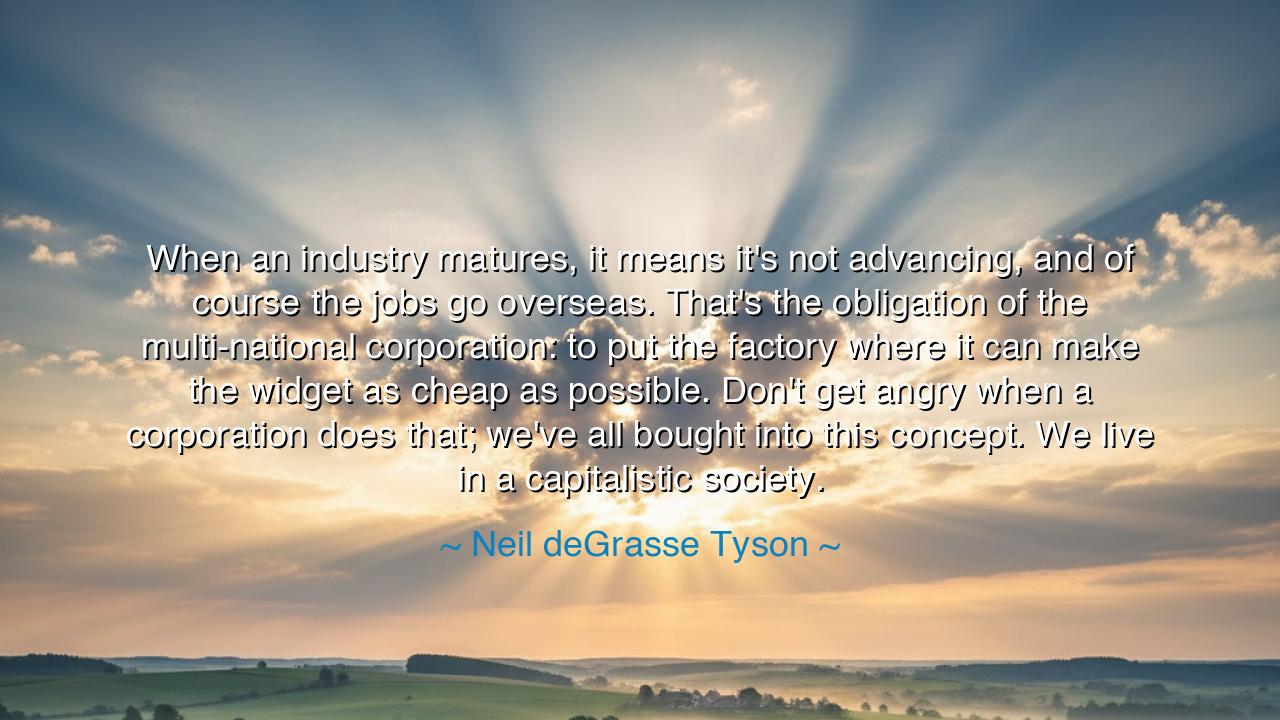
When an industry matures, it means it's not advancing, and of
When an industry matures, it means it's not advancing, and of course the jobs go overseas. That's the obligation of the multi-national corporation: to put the factory where it can make the widget as cheap as possible. Don't get angry when a corporation does that; we've all bought into this concept. We live in a capitalistic society.






Hear now the voice of Neil deGrasse Tyson, the stargazer and seeker of truths, who declared: “When an industry matures, it means it’s not advancing, and of course the jobs go overseas. That’s the obligation of the multi-national corporation: to put the factory where it can make the widget as cheap as possible. Don’t get angry when a corporation does that; we’ve all bought into this concept. We live in a capitalistic society.” These words strike like iron against stone, for they force us to confront the world we have built, a world where progress is measured in efficiency, and where loyalty to place and people often bends before the altar of profit.
The meaning is sharp and clear: when an industry ceases to innovate, it no longer holds the fire of progress. It becomes still, predictable, and easily transferred. The multi-national corporation, guided not by patriotism but by obligation to efficiency and growth, will move its work to lands where wages are low and costs are smaller. To many, this feels like betrayal; yet Tyson reminds us it is the very logic of a capitalistic society—a system that prizes the lowest price and greatest return above all. To condemn the corporation alone is to ignore our own complicity, for each time we reach for the cheapest product, we cast our vote for this order of things.
History gives us many mirrors of this truth. In the 20th century, America was the heart of steel, automobiles, and textiles. Cities like Detroit roared with the might of factories, employing millions. But as these industries matured, innovation slowed, and wages rose. Corporations turned their eyes abroad, to nations where costs were less. The factories closed, the jobs vanished, and proud cities became shadows of themselves. Yet at the same time, consumers welcomed cheaper goods on store shelves. Here we see the paradox Tyson names: grief at the loss, but acceptance of the bargain.
Nor is this tale unique to America. In Britain, the cradle of the Industrial Revolution, the great textile mills once ruled the world. But when India and Asia rose with lower costs, the mills fell silent. Whole communities that had thrived for generations collapsed. Yet British merchants still profited from cheaper imports, and citizens bought them readily. This pattern repeats across nations and ages: the industry matures, the work moves, the people mourn, yet the cycle continues, for it is the very rhythm of capitalism.
Tyson’s words are not a celebration of this order, but a reminder of its reality. He urges us not to blind ourselves with anger at the corporation, for it merely follows the path laid before it. Instead, the true question is: how shall we as a society respond? Shall we cling to dying industries, or shall we turn our energy toward innovation, creating the new rather than lamenting the old? For only through advancement—through fresh discovery, bold creativity, and unyielding invention—can a nation hold its place in the tide of the world.
The lesson, then, is this: do not mourn endlessly when jobs flee, but ask how new ones may be born. Invest in learning, in science, in creativity. Support not only the consumption of the cheapest goods, but the growth of local industries that carry the seeds of the future. As individuals, recognize your part in the chain: every purchase you make, every service you use, sustains or reshapes the system itself. Do not despair at the might of the multi-national corporation, but remember that its power exists only because we have “bought into this concept.”
Therefore, O seekers of wisdom, let Tyson’s words be as a mirror and a challenge. “We live in a capitalistic society.” Accept the truth of it, but do not be its prisoner. If you would see a different world, do not merely rage against corporations—reshape your own choices, encourage innovation, and demand that progress serve humanity as well as profit. For only in this way can we move beyond the sorrow of maturing industries and create a future where the advance of knowledge lifts all, rather than leaving some behind.
Thus remember: industry is like a river—it must keep flowing, or it will stagnate. Let your lives, your communities, and your nations do the same. Innovate, adapt, and create, for this is the only way to thrive in the ever-turning wheel of a capitalistic society.






AAdministratorAdministrator
Welcome, honored guests. Please leave a comment, we will respond soon